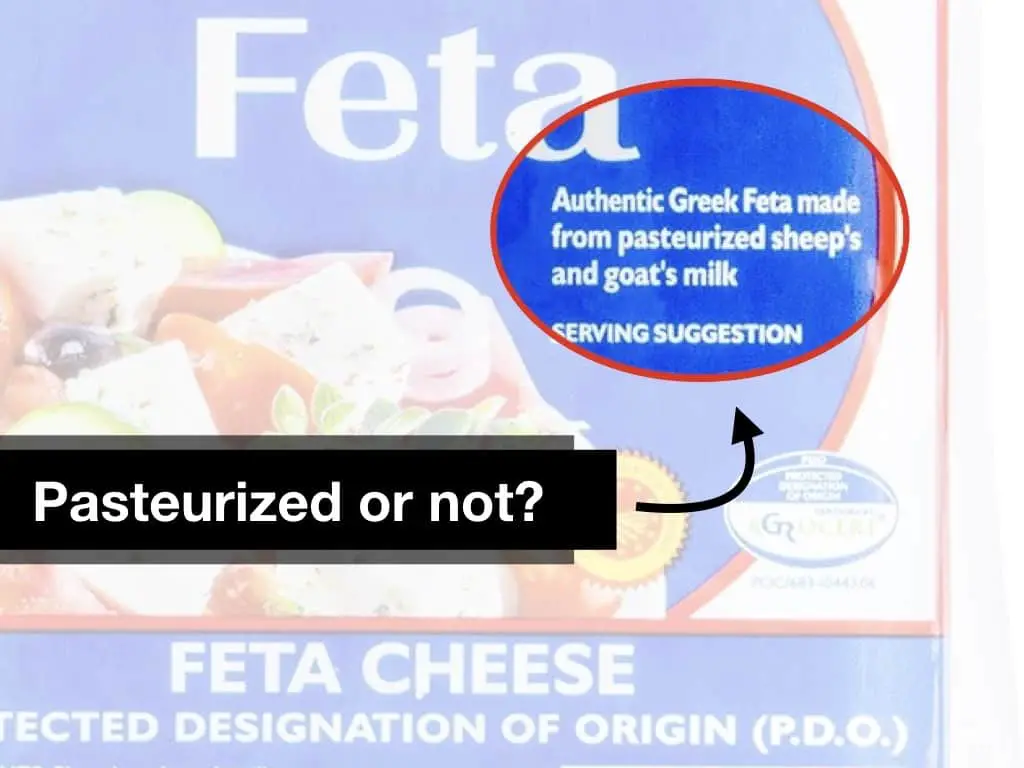Last Updated on September 15, 2023 by Aaron
Feta cheese can be made from both pasteurized and unpasteurized milk.
Most commercially produced feta cheeses, especially those available in the U.S. and many other countries, are made from pasteurized milk.
This is especially true for feta cheese that is intended for export or is sold in large chain stores, as there are regulations in many countries that require cheese to be made from pasteurized milk unless it is aged for a certain period of time.
Pasteurized feta cheese generally has a longer shelf life which leads to a more consistent product.
Pasteurization is named after the French scientist Louis Pasteur, who developed the process in the 19th century. It involves heating a liquid, like milk, to a specific temperature for a defined length of time and then immediately cooling it. This process is designed to kill pathogenic bacteria, yeasts, and molds that can cause diseases. However, it also can alter the taste, texture, and nutritional content of the milk to some extent.
It’s essential to check the label. The label will usually specify if the feta is made from pasteurized milk.
Read: How to Tell If Feta Is Bad.
Raw Milk Feta Cheese
Traditional feta cheese made in Greece and some other parts of the world can be made from raw, unpasteurized milk.
Feta cheese produced in specific regions of Greece has been granted a Protected Designation of Origin (PDO) status by the European Union. This means that only feta made in certain areas of Greece, following traditional methods and from a blend of sheep and goat’s milk, can be labeled as “Greek Feta” within the EU.
However, the PDO regulations for Greek feta do not mandate the use of raw milk. Most commercially produced Greek feta cheeses are made from pasteurized milk to ensure safety and consistency in the product. However, there are still traditional producers in Greece who might use raw milk.
Examples are farmstead cheesemakers, specialty cheese stores, and farmer’s markets. Some cheese enthusiasts believe that feta made from raw milk is superior in taste, better texture, and can contain beneficial bacteria or probiotics.
A study (1) analyzed cheeses made from both raw and pasteurized whole milk using advanced techniques like an electronic nose and tongue. The findings revealed that the electronic tongue was particularly sensitive to milk pasteurization, being able to distinguish between cheeses made from raw and pasteurized milk.
Some studies suggest that pasteurization might decrease certain vitamins in milk (5), although the majority of nutritional content remains intact.
A study (2) on Graviera cheese, which is also a traditional Greek cheese, revealed that pasteurization significantly impacts cheese properties, including pH, fat, oxidation levels, and fatty acid profiles. Given these insights, the choice between using raw or pasteurized milk in cheese production can affect the final product’s quality, taste, and shelf-life, a consideration that holds significance for cheeses like feta and beyond.
The Risk and 60-day Rules
Still, there is a potential risk of harmful bacteria in unpasteurized milk products, such as Listeria, Salmonella, and E. coli. Certain groups, including pregnant women, young children, the elderly, and immunocompromised individuals, are particularly vulnerable to these bacteria.
Many countries have regulations regarding the sale of raw milk cheeses.
In the U.S., for instance, certain types of cheeses that are traditionally consumed fresh (i.e., within a few days or weeks of being made) cannot be sold in their raw form in countries with the 60-day regulation. Examples include cheeses like feta, ricotta, or queso fresco. To sell these cheeses legally without aging them for 60 days, producers must make them from pasteurized milk.
Over time, the acidity and salinity present in the cheese-making process and the competitive activity of the cheese’s starter cultures can inhibit or reduce the population of these harmful pathogens. Aging cheese for 60 days is believed to help ensure that any potential pathogens in raw milk cheese die off or are reduced to safe levels.
But, it does not eliminate all risks.
The U.S. Food and Drug Administration (FDA) tested cheese made from unpasteurized milk, known as “raw milk cheese,” aged for 60 days (3). Feta (categorized under soft-fresh) amongst others like mozzarella and ricotta showed no contamination of pathogens, but this result was derived from a sample size of 24, which is relatively small compared to others.
Notably, a study (4) examined the survival of Listeria monocytogenes throughout the production of feta cheese suggesting that Listeria could still survive in feta cheese even after a 90-day aging period.
Pasteurized Feta Cheese Brands
There are numerous brands that produce pasteurized feta cheese, largely because most commercially available feta in places with dairy regulations is crafted from pasteurized milk.
| Feta Brand / Producer | Pasteurization |
| Dodoni | Yes |
| Vintage | Yes |
| Kraft | Yes |
| Murray’s | Yes |
| Valbreso | Yes |
| Pineland Farms | Yes |
| Athenos | Yes |
| Breeze Meadows Farm – Herb Feta | Unpasteurized / Raw |
| President | Yes |
| Real Greek | Yes |
| Greco | Yes |
| Mt. Vikos | Yes |
| Trader Joe’s | Yes |
| 365 Whole Foods Market | Yes |
| Organic Vally | Yes |
Popular brands include Athenos, which has gained prominence in the U.S. for its traditional, crumbled, and flavored feta offerings. President is another renowned international brand with a broad dairy range, including feta cheese. For those seeking a French twist, Valbreso provides pasteurized sheep’s milk feta.
Despite the wide availability of pasteurized feta brands, flavors and textures can vary significantly. Additionally, while most of the feta exported is pasteurized, they might offer unpasteurized versions in specific markets or locally.

